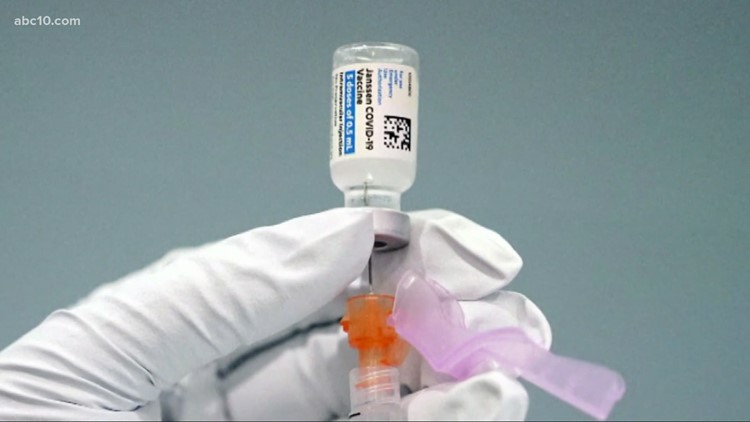SACRAMENTO, Calif. — This story was originally published first by CalMatters.
Hospitals in six rural California counties — all in remote, northern parts of the state — are now treating more COVID-19 patients than ever, breaking records by exceeding their winter surges.
Driven by sharp spikes in infections and low vaccination rates, COVID-19 patients hospitalized in Del Norte, Tuolumne, Lake, Humboldt, Nevada and Mendocino counties have more than tripled in the past five weeks, according to a CalMatters analysis of state data.
All six are experiencing record highs — more hospitalizations than at any other time since the pandemic began. Another three counties — Amador, Placer and Shasta — have similar numbers of hospitalized COVID patients compared to their winter surge.
These sparsely populated counties have limited hospital beds and staffing for intensive care units. Del Norte and Lake counties had zero ICU beds available as of Wednesday, according to the state data. State public health officials on Monday issued an order requiring hospitals statewide to accept transfer patients from facilities with limited ICU capacity.
Adventist Health Sonora, the only hospital serving Tuolumne County’s 54,000 residents, has already run out of room for its most severely sick patients.
“We are full. Our ICU is full. Our step-down unit is full,” Dr. Alexander Heard, the hospital’s medical officer told the board of supervisors on Tuesday. “Over the last two weeks we have seen the peak of our hospitalized patients since the beginning of the pandemic.”
Hospital officials in the remote counties say the surge is driven by unvaccinated people and the more contagious Delta variant. Four of the six counties with record hospital surges have a substantially lower vaccination rate than the state average.
At the same time, some of these hard-hit northern counties, including Lake, Mendocino and Shasta, are experiencing fast-growing wildfires and dangerous smoke that leaves its residents vulnerable to respiratory illnesses and heart attacks.
In Crescent City, Sutter Coast Hospital — the only hospital in Del Norte, California’s most northwestern county — has activated its surge plan: Non-emergency surgeries have been cancelled, visitors are restricted and additional staffing has been requested from the state Emergency Management Services Agency.
Hospitalized COVID-19 patients in Del Norte County increased from zero to 15 in the past month.
“Current case levels are driving some of the highest surge levels to date, requiring emergency response efforts,” Sutter Coast hospital CEO Mitch Hanna said at a Del Norte County Board of Supervisors meeting last week.
Driven by reopening, lack of vaccinations
Some local health officials said the state’s June 15 reopening, which lifted most pandemic restrictions, including mask mandates and bans on large gatherings, came too soon for areas where vaccination rates remain relatively low.
“We followed the recommendation from the state going back to full services, and our community was maybe not quite ready,” said Melody Cannon-Cutts, Del Norte County’s public health program manager. “We were not as vaccinated as we should have been.”
About 41.7% of Del Norte residents were fully vaccinated and 7.4% partially vaccinated as of Tuesday, compared to the statewide average of 64% full and 10% partial vaccination rates. Lake County, which has nearly three times the COVID-19 case rate of the state, has a 49.6% full and 8% partial vaccination rate. But of the two counties with record hospital surges, Mendocino and Humboldt, have vaccination rates close to the state average.
Counties with high numbers of vaccinated residents are faring better. Marin and Santa Clara counties, where more than 80% of the population is fully vaccinated, have only moderate increases in COVID-19 hospitalizations; their vaccination rates are the highest in the state.
Cannon-Cutts said recent events like the county fair are likely to have spread the virus among the unvaccinated in Del Norte County. But she said there is an upside to the worsening surge: More residents who had previously been vaccine-hesitant are visiting clinics to get their shots.
One of the counties experiencing the highest number of COVID-19 patients since the pandemic began is moving to reinstate some pandemic restrictions. Nevada County Public Health Officer Dr. Scott Kellermann issued an order Wednesday requiring people to wear masks in indoor public settings and businesses regardless of vaccination status, joining 10 other counties requiring indoor masking, including Los Angeles, Sacramento and most of the Bay Area.
Nevada County has seen an eleven-fold increase in positive coronavirus cases since June 15, and hospitalizations increased four-fold in the past month, peaking at 30.
In Grass Valley, Sierra Nevada Memorial Hospital, the largest hospital in Nevada County, has transferred two patients to other hospitals due to limited capacity and has requested six crisis nurses from the state, hospital President Dr. Brian Evans said.
However, hospitals in several remote, far-north counties — including Tehama, Modoc and Lassen — are not experiencing surges as severe as their neighbors’. (Alpine, Sierra, Sutter and Trinity do not have hospitals, so they send patients to facilities in neighboring counties.)
Compounding the uptick of COVID hospitalizations is the return of patients that delayed care early in the pandemic, Evans said. These dual forces have stretched resources and pushed hospitals to capacity both in the ICU and all other patient areas.
At Adventist Health Sonora, the new surge has resulted in the cancellation of some elective procedures and strict visitor limitations.
“At this point we are not allowing any visitors except for birth or imminent death,” Heard said. “We regret that decision. We regret we have to get there.”
Health officials continue to advocate for vaccinations as the most effective way to prevent serious illness, hospitalization and death.
Jaquelyn Lugg, a spokesperson for Adventist Health Sonora, said 86% of patients admitted between Aug. 1 and Aug. 14 were unvaccinated, as were all patients requiring ventilators or ICU treatment.
While the proportion of younger patients has been increasing statewide due to higher immunization rates among older populations, Lugg told CalMatters that her hospital has seen a variety of age groups and patients with no underlying health conditions.
“The one thing almost all of them have in common is not being vaccinated,” Lugg said.
CalMatters COVID-19 coverage, translation and distribution is supported by generous grants from the Blue Shield of California Foundation, the Penner Family Foundation and the California Health Care Foundation.
CALmatters.org is a nonprofit, nonpartisan media venture explaining California policies and politics.
Watch more
How to keep your job searches focused and organized | Dollars and Sense



